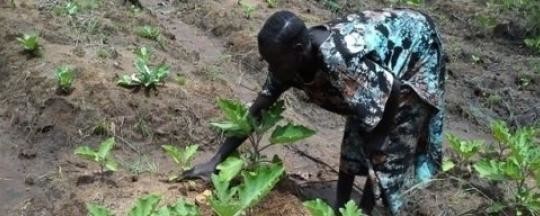Vegetable farmers in the Jonglei state capital Bor are trying to harvest their crops cultivated along the riverbank despite floods that overran their fields
Daborah Yar, a 35 year old mother of three, told Radio Tamazuj that her field of sukuma wiki, okra, and cabbage lay too close to the waters and so was affected by the rising river.
“I did not believe my friend who went to the site during the heavy rains of last week,” she told Radio Tamazuj. “She said, ‘Yar, your field could not be seen.’ My heart started beating and I immediately left my house and went and indeed I could not recognize my field as I was stepping on some of the fields flooded as well.”
“It was sad moment for us as farmers,” she added.
Yar is a prominent vegetable farmer in Marol market. Most of the farmers in the area are women.
Yar said despite the floods she has been able to send her two children to school in neighboring Uganda from the money she earns from her farm of three fedans. She said she earns more than 5000 South Sudanese pounds after the harvest comes in ever month or two.
She said the harvest depends on fertilizer given by the ministry of agriculture.
“Farming is only for the educated? Look at me,” she said. “I have not gone to school and I don’t even know English but am earning this money from the soil, so people ignore farming but it’s not right of them. They think a real work is when you are employed in the government office,” she said.
Selling seedlings
Yar said she started cultivating vegetables in 2011 and now she competes with the head of state farmers Paul Alim Angeth who grows a number of crops including seedlings of mango and guava plants.
Angeth has done several trainings in agriculture and he is the leading supplier of seeds in Bor, providing many upcoming farmers in Jonglei with seeds and seedlings. Many of the farmers have been supported by the international organizations such as Food and Agriculture Organization (FAO) and Catholic Relief Service (CRS).
The state ministry of agriculture, hand in hand with the agriculture organizations in the state supports the few farmers with tools and seeds. However the population of the farmers in Jonglei State still remains small, reflecting the history of pastoralist livelihood of the people.
The World Food Programme (WFP) says the level of food security this year could be far below 20%, according to reports.
File photo




